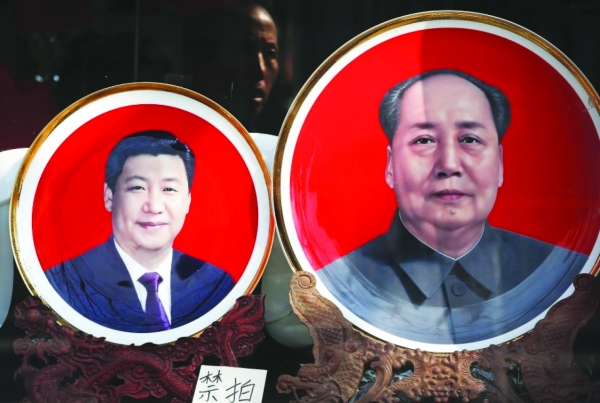시진핑 주석 체제도 모택동 시대의 독재 정권으로 회귀하고 있지만 중국은 서방세계 특히 미국의 진보적 지식인들과 학자들의 사랑을 받고 있다. 중국의 체제는 대단히 부패한 독재 정권이다.
중국에서는 이견을 표출하거나 정치적으로 반대하는 것은 거의 불가능하며 반정부활동 혹은 특별한 정책을 반대하다 체포된 사람들의 표현의 자유를 끊임없이 억압한다.
미국 내 진보 지식인들은 미국이 중국에 다가가려 하지 않고, 중국의 동기나 의도를 의심하며, 비밀에 쌓인 체제 속의 공산당의 역할을 반대한다고 비난하며 시진핑 정권의 진면목에 대해서는 거의 말을 하지 않는다.
미국 대학가에서도 학자들은 시진핑이 창조하는 괴물스러운 모습을 비판하지 않는다. 그 학자들은 오히려 트럼프 정부의 미국인 생활이나 미국 정책의 잘못된 부분에 초점을 맞추기를 더 좋아한다.
그 지식인들은 중국을 아시아에서 가장 강력한 국가로 내다보고 인도양에서 황해에 이르기까지 미국을 상대할 수 있는 국가로, 그리고 한반도에서 평화를 유지할 수 있는 유일한 힘을 갖고 있는 국가라는 칭찬 일색이다.
1949년 모택동의 공산당(적군파)이 장개석의 민족주의를 상대로 승리를 이뤄 왔던 것처럼 중국은 당시의 멋, 즉 유행을 따른다. 중국에 매료된 이 지식인들은 중국이 아시아 지역을 벗어나 군사력을 인도양에서 남중국해와 동중국해까지, 그리고 한반도까지 군사력을 팽창하는 것을 별로 심각하게 받아들이지 않고 있다.
사실 미국인들은 중국이 북한의 핵 프로그램을 포기하도록 김정은을 설득할 수 있는 구세주로 받아들이며 중국의 부상하는 영향력을 환영한다. 그러한 관점에서 영향력 있는 미국인들은 김정은이 비핵화 의지를 표명할 때 베이징에서 김정은에게 아낌없는 연회를 베풀어준 시진핑 주석에게 만장일치로 칭찬을 퍼부었다.

그러나 명백한 것은 김정은이 핵프로그램에 대해 기꺼이 토론하겠다는 의지 속에 시진핑 주석도 반대하지 않은 베일에 싸인 조건들이 나왔다는 점이다. 1950년 6·25전쟁처럼 또다시 남한이 북한의 공격에 노출되는 것, 즉 주한미군 철수나 미군기지를 폐쇄하는 것을 뜻하며 과거에도 우리가 들어왔던 것처럼 김정은은 똑 같은 용어를 되풀이 할 것이 분명하다.
또한 지난 수년간 정기적으로 도발을 해온 북한이 도발을 하지 않는다는 보장도 없다. 물론 그의 국민들을 탄압하는 데 익숙한 독재자로서, 시진핑 주석은 수만 명의 북한 주민들을 정치 포로수용소에 투옥시키는 것을 포함해 북한의 끔찍한 인권 유린 사태에 대해 문제 제기를 하지 않았다.
김정은에 영향력을 끼치는 시진핑에 대한 칭찬 일색의 미국 학자들은 아시아의 나머지 지역에서 중국의 활동에 의해 피해를 받지 않는 것처럼 보인다. 베트남, 필리핀, 말레이시아가 영유권을 주장하는 해역에 있는 조그마한 섬들에 대해 중국이 영유권을 주장하며 군사 기지를 건설한 남중국해는 폭발 직전의 분쟁지역이다.
미국의 항공모함 칼빈슨호가 베트남전쟁 당시 미국의 해병대 사령부가 있었던 베트남 중부의 주요 항구인 다낭에 입항했다 그러나 중국도 소함대를 그 지역에 파견했다.
미국의 전함은 중국의 도발에 대응해 깃발을 달고 순찰한다. 그러나 미국은 중국에게 그들의 주장을 포기하도록 설득하지 않는다. 베트남은 중국이 반대하고 미국이 베트남 주장에 상응하는 어떠한 조치를 취하지 않자 앞바다의 석유 시추 계획을 포기했다.
미국의 진보학자들은 중국이 파키스탄과 스리랑카에 항구를 건설하고 히말라야를 통해 인도양에 접근할 수 있도록 도로 건설을 하는 것처럼 중국이 남아시아에서 세력을 팽창하는 데 대해 어떠한 염려도 하지 않고 있다.
남중국해에 대한 중국의 일대일로(一帶一路) (One Belt, One Road) 개발 정책은 놀랄 만한 핵심 사업이다. 오랫동안 중국은 미국 군대의 엄청난 원조의 수혜국인 파키스탄과의 밀접한 관계를 구축함으로 인도뿐만 아니라 미국에게도 위협이 되고 있다.
그러나 미국 학자들은 절박함을 표하지 않는다. 오히려 그들은 북한의 모든 위협에 직면한 남한과의 강한 동맹으로 남아 있는 미국을 비난하며 중국이 한·미 양국이 받아들일 수 있는 방법으로 핵 문제를 해결해줄 것으로 믿고 있다.
미국의 진보학자들은 시진핑 주석의 독재정권의 진면목을 읽을 줄 알아야 하며 미국의 이익과 더불어 민주주의 이념에 위협이 되는 중국을 상대로 목소리를 높여야 한다. 미국의 진보학자들은 중국의 위협을 결코 인식하지 못했던 모택동 시대 후에 중국이 세계 무대에서 부상하는 것을 기뻐하고 있다.
불가피한 한가지 결론이 있다. 중국은 한국전쟁당시 대규모 중공군의 개입으로 생존하게 된 김일성 왕국의 창시자인 김일성의 손자인 김정은의 편을 들어주는 북한의 혈맹이라는 사실이다.
미국의 진보학자들은 수백만의 자국 국민들과 이웃 국민들에게도 위협을 주고 있는 침략적인 중국 정권의 새로운 현실에 대한 시각을 재조명해야 할 필요가 있다.

미래한국 편집위원
전 뉴욕타임스 특파원
China remains the darling of western, particularly American, intellectuals and academicians even though under President Xi Jinping it's reverting to the dictatorial habits of the era of Mao Zedung. The system is not only incredibly corrupt but also authoritarian. We hear constantly about suppression of free speech, of the arrests of those speaking out against the regime or against particular policies, while serious dissent and political opposition is simply not possible. The same intellectuals who once berated the U.S. for not moving closer to China, for remaining suspicious of Chinese motives and intentions, for objecting to the role of the Communist Party in a system masked in secrecy, have little to say about the real nature of the regime of Xi Jinping. On American campuses, scholars don't want to appear critical of the monster that Xi is creating. They would prefer to focus on the problems of American life, on President Trump, on all that's wrong with U.S. policy. As for China, intellectuals are nearly unanimous in their praise for the rise of China as what they see as the strongest country in Asia, a rival to the United States from the Indian Ocean to the Yellow Sea and the only force capable of bringing about enduring peace on the Korean peninsula. It is as though China were fashionable, the flavor of the month, just as it has been since the victory of Mao's Red Army in 1949 over the "Nationalist" Chinese of Chiang Kai-shek. While wooing China, these same intellectuals do not seem seriously concerned about China extending its military power around the periphery of Asia from the Indian Ocean to the South China Sea to the East China Sea and on to the Korean peninsula. In fact, they welcome China's rising influence, suggesting that China could be the savior, the force that will finally persuade Kim Jong-un in North Korea to listen to reason and abandon his nuclear program. In that spirit influential Americans were unanimous in their praise of Xi Jinping for having hosted Kim to a lavish banquet in Beijing while Kim declared his interest in "denuclearization." As should be obvious, however, Kim's expression of willingness to discuss his nuclear program came with mysterious conditions to which Xi did not object. It's certain that Kim will want to extract the same terms that we've heard before, meaning withdrawal of American troops and closure of American bases, again exposing South Korea to attack as in June 1950. Nor is there any guarantee that North Korea will not stage incidents as it has done periodically for years. And, of course, as a dictator accustomed to bullying his own people, Xi did not raise the issue of North Korea's egregious human rights violations, including the imprisonment of tens of thousands of its citizens in a massive gulag system. American academicians, full of praise of Xi for exercising his influence over Kim, do not seem disturbed by China's activities in the rest of Asia. The most obvious flashpoint is the South China Sea, over which China claims complete ownership while building military bases on small islands in waters also claimed by Vietnam, the Philippines and Malaysia. The U.S. aircraft carrier Carl Vinson remained in the South China Sea after a port call at the central Vietnamese port of Danang, headquarters for U.S. marines during the Vietnam War, but the Chinese responded by sending a flotilla of their own. U.S. warships periodically show the flag, challenging Chinese control, but they're not going to persuade the Chinese to relinquish their claim. Vietnam had to call off a project for drilling for oil off-shore after the Chinese objected and the Americans showed no sign of doing anything to enforce Vietnam's claim. Nor do American intellectuals appear concerned about China's spreading power South Asia, as seen in construction of ports in Pakistan and Sri Lanka and the construction of a road through the Himalayas giving access to the Indian Ocean. China's "One Belt, One Road Initiative" is just as alarming as its hold over the South China Sea. By forming a close relationship with Pakistan, a recipient of massive American military aid for years, China threatens not only India but the United States as well. There is, however, no outcry from American campuses. Rather, the tendency is to criticize the U.S. for remaining a staunch ally of South Korea in the face of all North Korea's threats and to believe the Chinese will really resolve the nuclear issue in a way that's acceptable to both the U.S. and South Korea. It should not be difficult to see the true nature of the dictatorship that Xi is leading and to ask why American academicians are not raising voices against China as a threat to democratic ideals as well as American interests. American intellectuals were so delighted over China's emergence on the world stage after Mao's era that they have never quite recognized the menace of a new China. One conclusion is inescapable: China is so closely allied with North Korea that it's always going to side with Kim Jong-un, grandson of the dynasty founder, Kim Il-sung, who survived with massive Chinese intervention in the Korean War. Liberal scholars need to adjust their outlook to the new reality of an aggressive Chinese regime that poses a threat to millions of its own people as well as its neighbors.
외부게재시 개인은 출처와 링크를 밝혀주시고, 언론사는 전문게재의 경우 본사와 협의 바랍니다.


